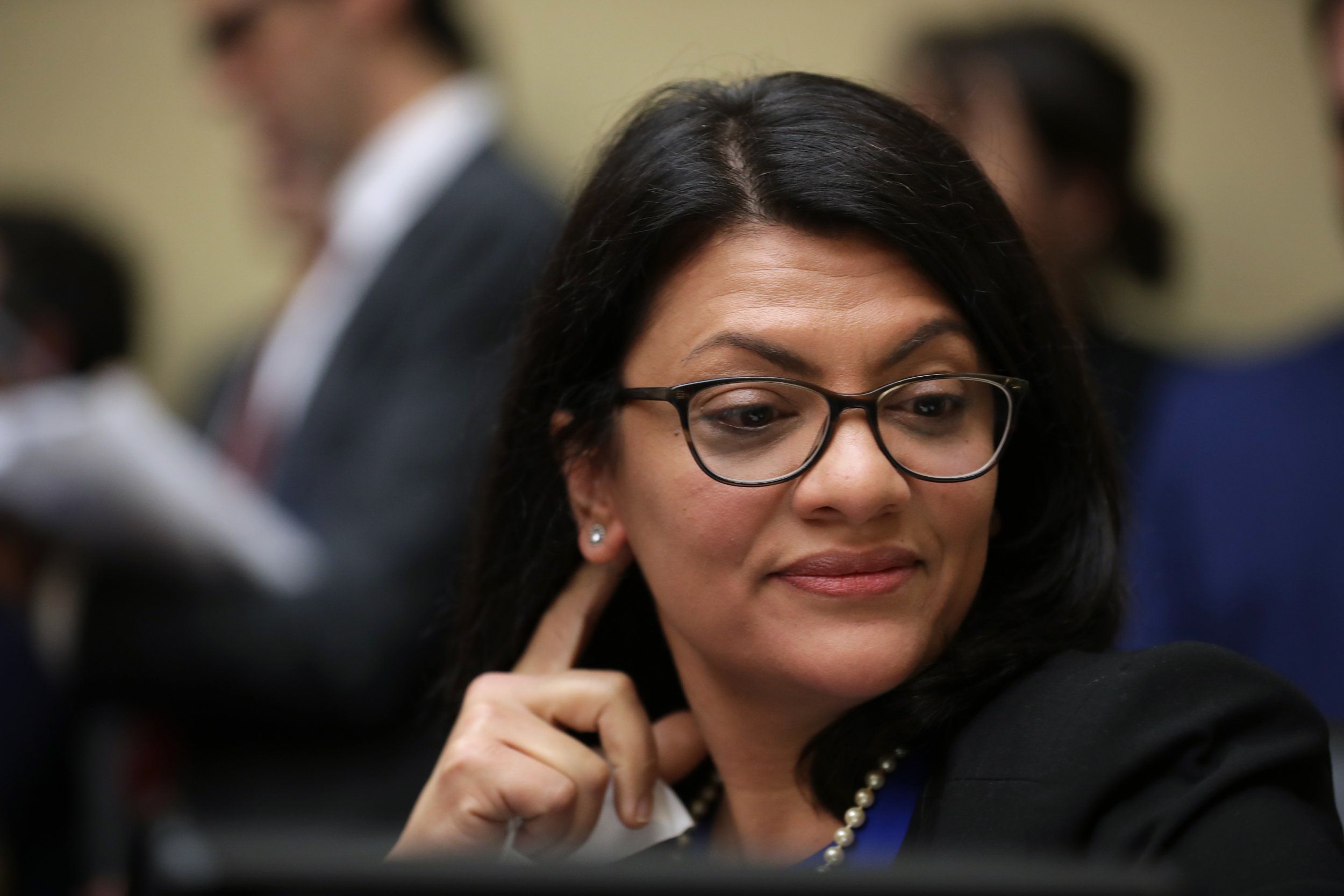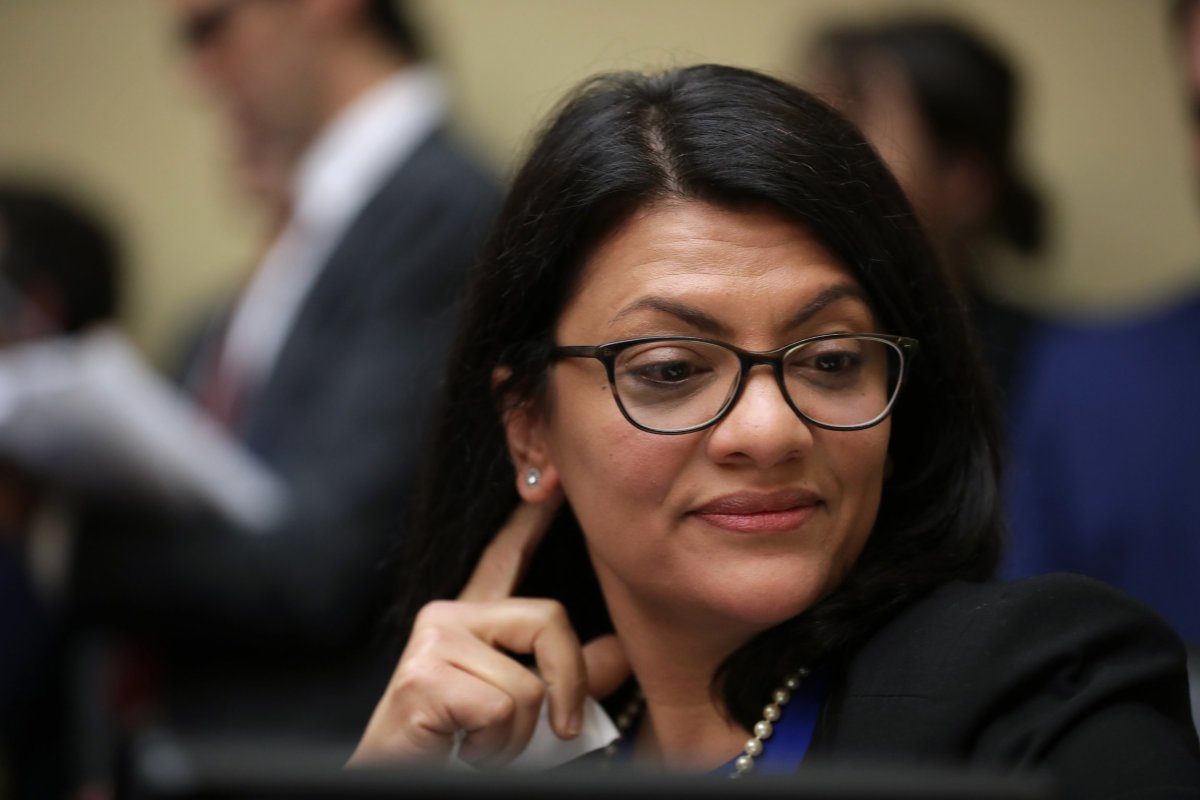
Michigan Representative Rashida Tlaib said that bank executives were "greenwashing" their role in funding climate change on Wednesday.
The chief executives of Bank of America, BNY Mellon, Citigroup, Goldman Sachs, JPMorgan Chase, Morgan Stanley and State Street appeared together in front of Congress for the first time in 10 years to face questions from the House Committee on Financial Services. At the hearing, which discussed changes large banks had made since the financial collapse of 2008, Tlaib asked the CEOs if they would change bank behavior to address climate change.
The bank leaders said they had and continue to take action on climate change, leading Tlaib to respond: "Don't say that you're clean and sustainable financing because your companies' words are not consistent with your actions. I would call this gaslighting."
"But for the sake of this hearing, I'll say that you are greenwashing your own track record and duping the American people into believing that you are helping address climate change. On the record, will any of your banks make a commitment to phase out your investments in fossil fuels and dirty energy?"
Tlaib earlier told JPMorgan Chase CEO Jamie Dimon that, "your bank alone has provided more than $195 billion in fossil fuel lending and underwriting over the past three years since signing of the Paris Climate agreement, making your bank the number funder of fossil fuels in the world."
She also said that Citigroup and Bank of America have provided over $100 billion each in fossil fuel funding in the last three years, making them, respectively, the third and fourth largest funders of fossil fuels.
Michael Corbat, the CEO of Citigroup, responded by saying his company had funded $150 billion in clean energy projects "in recent history." Dimon said JPMorgan Chase would have green facilities in 2020 and that his company devoted about $200 billion to similar projects each year.

Toward the beginning of the hearing, New York Democrat Carolyn Maloney zeroed in on gun transactions, noting that Citibank and Bank of America had issued restrictions related to gun transactions following last year's Parkland, Florida, shooting. Citigroup said it would not allow its business customers to sell firearms to people who are under 21 and have not passed a backgruond check. Bank of America later said it would no longer lend to gun manufacturers who create military-style weapons for civilians.
Maloney cited an annual review from JPMorgan Chase CEO Jamie Dimon, which came out last week, and his remarks about responsible banking.
"Actions speak louder than words on guns, Mr. Dimon. And from what I can tell, these are just words to you. Let's talk about some of the actions," she said, questioning why the bank had not altered its policies regarding gun companies.
"Even after the horrific massacres at Sandy Hook, Las Vegas and Parkland, JPMorgan has arranged about $273 million of loans for manufactures of military-style firearms, the same weapons that are being used in mass shootings all over our country. Even worse, JPMorgan took partial ownership of Remington, the manufacturer of the exact gun that was used to kill 20 children in the Sandy Hook shooting. And JPMorgan has refused to adopt a policy to ensure responsible lending to the gun industry."
Dimon responded by saying that the bank only had a small relationship with gun manufacturers.
Later in the hearing, Wisconsin Republican Sean Duffy countered Democrat support for limiting gun sales, and questioned Bank of America CEO Brian Moynihan about the company's gun policy. Duffy depicted the bank's change as an alteration that catered to coastal Democrats.
"I look at the gun policy and I think that there's a lot of Americans who you serve would really disagree with that policy," Duffy said.
The lawmaker's questions occurred largely along partisan lines for most of the hearing, with chair Maxine Waters saying the banks appear to treat fines as "simply the cost of doing business."
"Since the crisis, the megabanks have collectively made over $780 billion in profits or nearly five times the amount they paid in fines. And despite all of the compliance failures under their watch, no one has made out better than the CEOs. One made as much as $30 million a year. Another [made] 486 times the amount a medium employee at the bank is paid. It will always be profitable for the banks to swindle consumers, investors and small businesses if no one is going to hold them accountable," she said.
North Carolina Republican Patrick McHenry, the ranking Republican on the committee, countered Waters' tone, depicting the hearing as a farce. Highlighting economic growth and the strength of labor market, he said the hearing was only being held because of the banks' size.
However, he did express concern for the U.K.'s exit from the European Union, currently set to occur Friday, to rock the financial world.
"We should be using this hearing to work together to ensure the proper prep ration," he said. "And Brexit's not the only issue. Chinese debt and the slowing nature of the global economy is a significant issue for the American people and for financial institutions. We should be focused on that today. and instead we have seven of you, with three different business models, here before us because you're big. So I don't think the majority called this hearing to talk about those systemic risk issues."
Uncommon Knowledge
Newsweek is committed to challenging conventional wisdom and finding connections in the search for common ground.
Newsweek is committed to challenging conventional wisdom and finding connections in the search for common ground.
About the writer
Daniel Moritz-Rabson is a breaking news reporter for Newsweek based in New York. Before joining Newsweek Daniel interned at PBS NewsHour ... Read more
To read how Newsweek uses AI as a newsroom tool, Click here.








